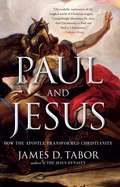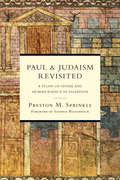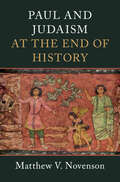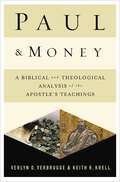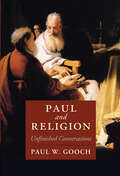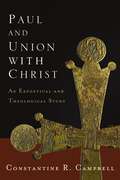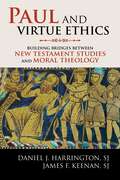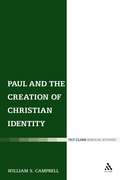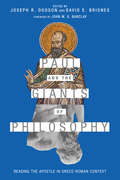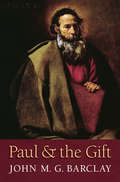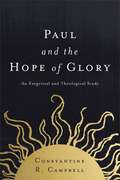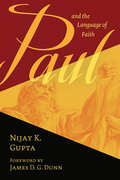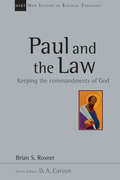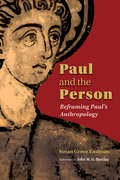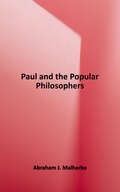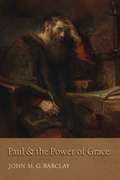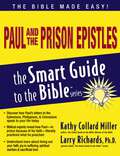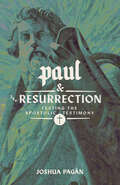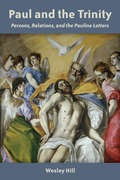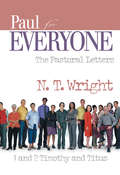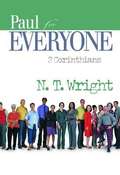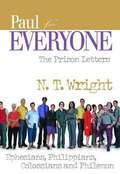- Table View
- List View
Paul and Jesus: How the Apostle Transformed Christianity
by James D. TaborThis fascinating examination of the earliest years of Christianity reveals sharply competing ideas about the significance of Jesus and his teachings and shows how the man we call St. Paul shaped Christianity as we know it today. Historians know almost nothing about the two decades following the crucifixion of Jesus, when his followers regrouped and began to spread his message. During this time the apostle Paul joined the movement and began to preach to the gentiles. Using the oldest Christian documents that we have--the letters of Paul--as well as other early Christian sources, historian and scholar James Tabor reconstructs the origins of Christianity. Tabor reveals that the familiar figures of James, Peter, and Paul sometimes disagreed fiercely over everything from the meaning of Jesus' message to the question of whether converts must first become Jews. Tabor shows how Paul separated himself from Peter and James to introduce his own version of Christianity, which would continue to develop independently of the message that Jesus, James, and Peter preached. Paul and Jesus gives us a new and deeper understanding of Paul as it illuminates the fascinating period of history when Christianity was born out of Judaism and became the religion we recognize today.
Paul and Judaism Revisited: A Study of Divine and Human Agency in Salvation
by Preston M. SprinklePreaching's Preacher's Guide to the Best Bible Reference for 2014 (Pauline Studies) Ever since E. P. Sanders published Paul and Palestinian Judaism in 1977, students of Paul have been probing, weighing and debating the similarities and dissimilarities between the understandings of salvation in Judaism and in Paul. Do they really share a common notion of divine and human agency? Or do they differ at a deep level? And if so, how? Broadly speaking, the answers have lined up on either side of the old perspective and new perspective divide. But can we move beyond this impasse? Preston Sprinkle reviews the state of the question and then tackles the problem. Buried in the Old Testament's Deuteronomic and prophetic perspectives on divine and human agency, he finds a key that starts to turn the rusted lock on Paul's critique of Judaism. Here is a proposal that offers a new line of investigation and thinking about a crucial issue in Pauline theology.
Paul and Judaism at the End of History
by Matthew V. NovensonThe apostle Paul was a Jew. He was born, lived, undertook his apostolic work, and died within the milieu of ancient Judaism. And yet, many readers have found, and continue to find, Paul's thought so radical, so Christian, even so anti-Jewish – despite the fact that it, too, is Jewish through and through. This paradox, and the question how we are to explain it, are the foci of Matthew Novenson's groundbreaking book. The solution, says the author, lies in Paul's particular understanding of time. This too is altogether Jewish, with the twist that Paul sees the end of history as present, not future. In the wake of Christ's resurrection, Jews are perfected in righteousness and – like the angels – enabled to live forever, in fulfilment of God's ancient promises to the patriarchs. What is more, gentiles are included in the same pneumatic existence promised to the Jews. This peculiar combination of ethnicity and eschatology yields something that looks not quite like Judaism or Christianity as we are used to thinking of them.
Paul and Money: A Biblical and Theological Analysis of the Apostle’s Teachings and Practices
by Verlyn Verbrugge Keith R. KrellThe apostle Paul, one of the most prominent figures in the early Jesus movement, had a lot to say about money. His letters deal with real people as they lived their Christian lives in the Greco-Roman world. He finds it necessary to address “those who are rich in this present world” (1 Tim 6:17). But he also has to address those do not want to work, for whatever reason, and are “idle and disruptive” (2 Thess 3:6). Moreover, whereas most churches today have a certain socio-economic homogeneity, some of Paul’s churches had a combination of upper class wealthy people and lower class slaves worshiping side-by-side, and it inevitably created friction (esp. 1 Cor 11:17–34). During the past twenty years a significant amount of research has been done on class-consciousness in the Greco-Roman world and on the significance of Paul’s fund-raising venture “for the poor among the Lord’s people in Jerusalem”—“the collection”—for his ministry. Relying on the surprising results of current Pauline scholarship and a careful exegesis of a variety of New Testament texts, this book offers a thorough investigation of the apostle Paul’s sayings and dealings with money.
Paul and Religion: Unfinished Conversations (Cambridge Studies in Religion, Philosophy, and Society)
by Paul W. GoochPaul and Religion demonstrates the continuing and contemporary relevance of the most important, and most controversial, figure of early Christianity. Paul Gooch interrogates the Pauline writings for their meaning as well as implications for religion as an entire form of life, a stance on the world expressed in distinctive practices. Bringing a philosophical approach to this topic, he connects Paul's ideas to lived experience. In a conversational style, Gooch explores Paul's experience of grace and his dismissal of distinctive markers of religious identity in favour of love as binding together a community. Contrary to common expectations, he finds within Paul's letters material for conversations about issues in our day, such as gender and sexuality. From his close reading of the Letters, Gooch argues that the Pauline religious form of life is not identical with institutional Christianity. Indeed, his conclusions may be welcome to those who belong to other faiths.
Paul and Union with Christ: An Exegetical and Theological Study
by Constantine R. CampbellPaul and Union with Christ fills the gap for biblical scholars, theologians, and pastors pondering and debating the meaning of union with Christ. Following a selective survey of the scholarly work on union with Christ through the twentieth century to the present day, Greek scholar Constantine Campbell carefully examines every occurrence of the phrases ‘in Christ’, ‘with Christ’, ‘through Christ’, ‘into Christ,’ and other related expressions, exegeting each passage in context and taking into account the unique lexical contribution of each Greek preposition. Campbell then builds a holistic portrayal of Paul’s thinking and engages contemporary theological discussions about union with Christ by employing his evidence-based understanding of the theme. This volume combines high-level scholarship and a concern for practical application of a topic currently debated in the academy and the church. More than a monograph, this book is a helpful reference tool for students, scholars, and pastors to consult its treatment of any particular instance of any phrase or metaphor that relates to union with Christ in the Pauline corpus.
Paul and Virtue Ethics: Building Bridges Between New Testament Studies and Moral Theology
by Daniel J Harrington S.J. James Keenan SJDaniel Harrington, SJ, and James Keenan, SJ, approach moral theology through virtue ethics, asking the key questions, Who am I? Who do I want to become? And how do I get there? With the apostle Paul as a guide, the authors examine the virtues that flow from Scripture and provide a lens through which to interpret Scripture. They explore theological virtues faith, hope, and love; natural virtues and vices; social ethics, and sexual ethics.
Paul and the Creation of Christian Identity
by William S. CampbellIn the dominant interpretation of the Antioch incident, Paul is viewed as separating from Peter and Jewish Christianity to lead his own independent mission. This book argues that diversity in Christ was fundamental to Paul and that particularly in his ethical guidance, this received recognition.
Paul and the Giants of Philosophy: Reading the Apostle in Greco-Roman Context
by Joseph R. DodsonWhat forces shaped the intellectual world of the apostle Paul? How familiar was he with the great philosophers of his age, and to what extent was he influenced by them? When he quoted Greco-Roman sources, what was his aim? Pauline scholars wrestle with such questions in journal articles and technical monographs, but now Paul and the Giants of Philosophy brings the conversation into the college classroom and the church. Each essay addresses Paul's interaction with Greco-Roman philosophical thinking on a particular topic, such as faith, slavery, gift-giving, and the afterlife. And each chapter includes discussion questions and reading lists to help readers engage the material further. Dodson and Briones have gathered contributors with diverse views from various traditions who are united in the desire to make Paul's engagement with ancient philosophy accessible to many readers.
Paul and the Gift
by John M. BarclayA fresh scholarly reading of grace in Paul's theology In this book esteemed Pauline scholar John Barclay presents a strikingly fresh reading of grace in Paul's theology, studying it in view of ancient notions of "gift" and shining new light on Paul's relationship to Second Temple Judaism.Paul and the Gift centers on divine gift-giving, which for Paul, Barclay says, is focused and fulfilled in the gift of Christ. He offers a new appraisal of Paul's theology of the Christ-event as gift as it comes to expression in Galatians and Romans, and he presents a nuanced and detailed discussion of the history of reception of Paul. This exegetically responsible, theologically informed, hermeneutically useful book shows that a respectful, though not uncritical, reading of Paul contains resources that remain important for Christians today.
Paul and the Hope of Glory: An Exegetical and Theological Study
by Constantine R. CampbellA Unique Study of Pauline Eschatology that Is Both Exegetical and TheologicalOne of the trajectories coming out of Constantine Campbell's award-winning book Paul and Union with Christ is the significance of eschatology for the apostle. Along with union with Christ, eschatology is a feature of Paul&’s thinking that affects virtually everything else.While union with Christ is the "webbing" that joins Paul's thought together, eschatology provides the "shape" of his thought, and thus gives shape to his teaching about justification, resurrection, the cross, ethics, and so forth. There is considerable debate, however, about Paul's eschatology, asking whether he is a "covenant" or an "apocalyptic" theologian.In Paul and the Hope of Glory Campbell conducts a thorough exegetical study of the relevant elements of Paul's eschatological language, metaphors, and images including "parousia," "the last day," "inheritance," "hope," and others. He examines each passage in context, aiming to build inductively an overall sense of Paul's thinking. The results of this exegetical study then feed into a theological study that demonstrates the integration of Paul's eschatological thought into his overall theological framework.The study is comprised of three parts:The first part introduces the key issues--both exegetical and theological--and sets the parameters and methodology of the book. It also offers an historical survey of the scholarly work produced on Paul's eschatology through the twentieth century to the present day.The second part contains the detailed exegetical analysis, with chapters on each important Pauline phrase, metaphor, and image related to eschatology.The third part turns its attention to theological synthesis. It recapitulates relevant conclusions from the evidence adduced in part two and launches into theological discussion engaging current issues and debates.This volume combines high-level scholarship and a concern for practical application of a topic currently debated in the academy and the church. More than a monograph, this book is a helpful reference tool for students, scholars, and pastors to consult its treatment of any particular instance of any phrase or metaphor that relates to eschatology in Paul's thinking.
Paul and the Language of Faith
by Nijay K. GuptaA dynamic reading of Paul&’s faith language, outlining its subtle nuances as belief, trust, and faithfulness.Faith language permeates the letters of Paul. Yet, its exact meaning is not always clear. Many today, reflecting centuries of interpretation, consider belief in Jesus to be a passive act. In this important book, Nijay Gupta challenges common assumptions in the interpretation of Paul and calls for a reexamination of Paul&’s faith language. Gupta argues that Paul&’s faith language resonates with a Jewish understanding of covenant involving goodwill, trust, and expectation. Paul&’s understanding of faith involves the transformation of one&’s perception of God and the world through Christ, relational dependence on Christ, as well as active loyalty to Christ. Pastors and scholars alike will benefit from this close examination of Paul&’s understanding and use of faith language. For Gupta, Paul&’s understanding involves a divine-human relationship centered on Christ that believes, trusts, and obeys.
Paul and the Law: Keeping the Commandments of God (New Studies in Biblical Theology #Volume 31)
by Brian S. RosnerPreaching's Preacher's Guide to the Best Bible Reference for 2014 (Pauline Studies) "For neither circumcision counts for anything nor uncircumcision, but keeping the commandments of God" (1 Cor 7:19). The apostle Paul's relationship to the Law of Moses is notoriously complex and much studied. Difficulties begin with questions of definition (of the extent of Paul's corpus and the meanings of "the law") and are exacerbated by numerous problems of interpretation of the key texts. Major positions are entrenched, yet none of them seems to know what to do with all the pieces of the puzzle. Inextricably linked to Paul's view of the law is his teaching concerning salvation history, Israel, the church, anthropology, ethics and eschatology. Understanding "Paul and the law" is critical to the study of the New Testament, because it touches on the perennial question of the relationship between the grace of God in the gift of salvation and the demand of God in the call for holy living. Misunderstanding can lead to distortions of one or both. This fresh and valuable study is something of a breakthrough, bringing neglected evidence to the discussion and asking different questions of the material, while also building on the work of others. Brian Rosner argues that Paul undertakes a polemical re-evaluation of the Law of Moses, which involves not only its repudiation as law-covenant and its replacement by other things, but also its wholehearted re-appropriation as prophecy (with reference to the gospel) and as wisdom (for Christian living).
Paul and the Person: Reframing Paul's Anthropology
by Susan Grove EastmanIn this book Susan Grove Eastman presents a fresh and innovative exploration of Paul&’s participatory theology in conversation with both ancient and contemporary conceptions of the self. Juxtaposing Paul, ancient philosophers, and modern theorists of the person, Eastman opens up a conversation that illuminates Paul&’s thought in new ways and brings his voice into current debates about personhood.
Paul and the Person: Reframing Paul's Anthropology
by Susan Grove EastmanIn this book Susan Grove Eastman presents a fresh and innovative exploration of Paul&’s participatory theology in conversation with both ancient and contemporary conceptions of the self. Juxtaposing Paul, ancient philosophers, and modern theorists of the person, Eastman opens up a conversation that illuminates Paul&’s thought in new ways and brings his voice into current debates about personhood.
Paul and the Popular Philosophers
by Abraham J. MalherbeThese studies continue a tradition of scholarship that flourished around the turn of the century when new editions of ancient philosophical sources were published. Professor Malherbe, however, widens the scope to include other philosophical traditions. <p><p>He recognizes and identifies the influences of Platonists, Peripatetics, Cynics, Stoics, Epicureans, and Pythagoreans. These popular philosophers aimed at moral reform; they shared both in their substance and in the techniques employed. Yet, they need to be distinguished in order to discern their influence, if any, on Paul.
Paul and the Power of Grace
by John M. BarclayPaul and the Gift transformed the landscape of Pauline studies upon its publication in 2015. In it, John Barclay led readers through a recontextualized analysis of grace and interrogated Paul&’s original meaning in declaring it a &“free gift&” from God, revealing grace as a multifaceted concept that is socially radical and unconditioned—even if not unconditional. Paul and the Power of Grace offers all of the most significant contributions from Paul and the Gift in a package several hundred pages shorter and more accessible. Additionally, Barclay adds further analysis of the theme of gift and grace in Paul&’s other letters—besides just Romans and Galatians—and explores contemporary implications for this new view of grace.
Paul and the Prison Epistles (The Smart Guide to the Bible Series)
by Kathy Collard MillerSome of the most joy-filled books in the New Testament were written from a small, dark prison cell. Although hungry, cold, and scarred, Paul exalted his savior's love and grace to the Ephesians, Philippians, and Colossians. How was Paul able to rest so securely? And how can you today? The Smart Guide to the BibleTM: Paul and the Prison Epistles will brighten your life by illuminating how God is with you in all your circumstances. You'll be uplifted by Paul's instructions for finding joy in suffering, engaging in spiritual warfare, receiving God's love, living out your faith, and so much more. You, too, will be able to rejoice in the Lord always!Be Smart About:Pauls' CircumstancesJoy No Matter WhatSpiritual WarfareGod's GraceWhy Paul Wrote His lettersLiving Out Your Faith
Paul and the Resurrection: Testing the Apostolic Testimony
by Joshua A. PagánFor the contemporary believer, Paul's role in the historical setting of the Resurrection is far more than a matter of theological curiosity. The Christian justification for rational belief in the Resurrection is in large part anchored in Paul's justification for rational belief in the authenticity of his own experience. In Paul we find the earliest and best attested documentary evidence for a historical investigation of the miraculous event. Moreover, his epistles are an indispensable source of independent corroboration of the gospel narratives. Opponents of Christianity have formulated a variety of hypotheses to account for Paul's experience on the Damascus Road. Some propose that Paul was deceptive; others argue that he was deluded; and still others contend he came to believe a legendary development. Yet according to the Christian hypothesis, Paul's claim to have encountered the risen Jesus is dependable, and his testimony can be shown to withstand the scrutiny of critics. In this innovative, interdisciplinary study, PagÁn combines the analytic tools of history and philosophy to explore and evaluate competing explanations of Paul's belief in the Resurrection of Jesus.
Paul and the Rhetoric of Reversal in 1 Corinthians
by Matthew R. MalcolmThe first letter to the Corinthians is one of the most discussed biblical books in New Testament scholarship today. Despite this, there has been no consensus on its arrangement and central theme, in particular why the topic of the resurrection was left until the end of the letter, and what its theological significance would have been to the Corinthian church. Matthew R. Malcolm analyses this rhetoric of 'reversal', examines the unity of the epistle, and addresses key problems behind particular chapters. He argues that while Jewish and Greco-Roman resources contribute significantly to the overall arrangement of the letter, Paul writes as one whose identity and rhetorical resources of structure and imagery have been transformed by his preaching, or kerygma, of Christ. The study will be of interest to students of New Testament studies, Pauline theology and early Christianity.
Paul and the Trinity: Persons, Relations, and the Pauline Letters
by Wesley HillPaul’s ways of speaking about God, Jesus, and the Spirit are intricately intertwined: talking about any one of the three, for Paul, implies reference to all of them together. However, much current Pauline scholarship discusses Paul’s God-, Christ-, and Spirit-language without reference to trinitarian theology.In contrast to that trend, Wesley Hill argues in this book that later, post-Pauline trinitarian theologies represent a better approach, opening a fresh angle on Paul’s earlier talk about God the Father, Jesus Christ, and the Spirit. Hill looks critically at certain well-known discussions in the field of New Testament studies -- those by N. T. Wright, Richard Bauckham, Larry Hurtado, and others -- in light of patristic and contemporary trinitarian theologies, resulting in an innovative approach to an old set of questions.Adeptly integrating biblical exegesis and historical-systematic theology, Hill’s Paul and the Trinity shows how trinitarian theologies illumine interpretive difficulties in a way that more recent theological concepts have failed to do.Watch a 2015 interview with the author of this book here:
Paul as an Administrator of God in 1 Corinthians
by John K. GoodrichThis book looks in detail at Paul's description of apostles in 1 Corinthians 4 and 9 as divinely appointed administrators (oikonomoi) and considers what this tells us about the nature of his own apostolic authority. John Goodrich investigates the origin of this metaphor in light of ancient regal, municipal, and private administration, initially examining the numerous domains in which oikonomoi were appointed in the Graeco-Roman world, before situating the image in the private commercial context of Roman Corinth. Examining the social and structural connotations attached to private commercial administration, Goodrich contemplates what Paul's metaphor indicates about apostleship in general terms as well as how he uses the image to defend his apostolic rights. He also analyses the purpose and limits of Paul's authority - how it is constructed, asserted, and contested - by examining when and how Paul uses and refuses to exercise the rights inherent in his position.
Paul for Everyone
by N. T. WrightWriting in an approachable and anecdotal style, Tom Wright helps us to see the pastoral nature of these letters. Paul is anxious to see that those who profess the faith should allow the gospel to transform the whole of their lives, right down to the deepest part of their personality, and is concerned that every teacher of the faith should know how to build up the community in mutual support, rather than tearing it apart through the wrong sort of teaching and behavior. Tom Wright has undertaken a tremendous task: to provide guides to all the books of the New Testament, and to include in them his own translation of the entire text. Each short passage is followed by a highly readable discussion, with background information, useful explanations and suggestions, and thoughts as to how the text can be relevant to our lives today. A glossary is included at the back of the book. The series is suitable for group study, personal study, or daily devotions.
Paul for Everyone: 2 Corinthians
by N. T. WrightMaking use of his scholar's understanding, yet writing in an approachable and anecdotal style, Tom Wright helps us to understand from the beginning of the second letter to the Corinthians that something unexplained yet terrible has happened. We feel the pain of Paul from the very opening lines as he confronts dreadful issues of sorrow and hurt, emerging with a clearer picture of what it meant to say that Jesus himself suffered for us and rose up in triumph. The letter itself moves through tragedy and from there leads into the sunlight. Tom Wright has undertaken a tremendous task: to provide guides to all the books of the New Testament, and to include in them his own translation of the entire text. Each short passage is followed by a highly readable discussion, with background information, useful explanations and suggestions, and thoughts as to how the text can be relevant to our lives today. A glossary is included at the back of the book. The series is suitable for group study, personal study, or daily devotions.
Paul for Everyone: Ephesians, Philippians Colossians and Philemon
by N. T. WrightMaking use of his scholar's understanding, yet writing in an approachable and anecdotal style, Tom Wright captures the verve and sparkle of these letters. Paul wrote the letters while in prison facing possible death, but their passion and energy are undimmed. They reveal Paul's longing to see young churches grow in faith and understanding, rooted in Jesus himself, and to see this faith worked out in practice. Wright's stimulating comments are combined with his own fresh and inviting translation of the text. Tom Wright has undertaken a tremendous task: to provide guides to all the books of the New Testament, and to include in them his own translation of the entire text. Each short passage is followed by a highly readable discussion, with background information, useful explanations and suggestions, and thoughts as to how the text can be relevant to our lives today. A glossary is included at the back of the book. The series is suitable for group study, personal study, or daily devotions.
